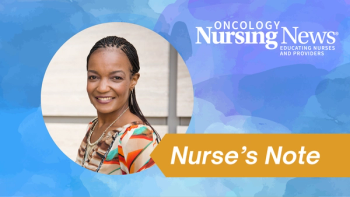
- April 2016
- Volume 10
- Issue 3
Quality of Life: Not Just for Patients
We now have tools that enable us to measure the quality of life of professionals who deliver care to patients.
Quality of life is a concept that oncology nurses are very familiar with. Most nurses would say that quality of life is very important in our patients’ lives. However, it’s also important in our lives as we deliver patient care.
Most of us are familiar with assessing or measuring quality of life (QOL) from a patient’s perspective. We now have tools that enable us to measure the QOL of professionals who deliver care to patients.
One of these tools is the Professional QOL or ProQOL Scale, which measures the positive and negative effects of professionally caring for others. The ProQOL 5, available in 21 languages at no cost on the website
While many tools focus only on the negative consequences of providing care, the ProQOL 5 includes a subscale on compassion satisfaction, or the positive aspects of caring for others in a professional role. Compassion fatigue, on the other hand, is a manifestation of the negative aspects and may include the symptoms of exhaustion, frustration, anger, and depression.
Another subscale measures burnout. From the research perspective, burnout is associated with feelings of hopelessness and difficulties in dealing with work or in performing a job effectively. These negative feelings usually have a gradual onset, and typically reflect the feeling that job performance makes no difference, or they can be associated with work overload and/or a non-supportive work environment.
Preventing burnout and nipping it in the bud when it occurs is the responsibility of both the nurse and the workplace. On the personal level, we all need to be able to speak up and ask for help or request a break. Proactive workplaces routinely survey staff to assess the workload and care delivery, and identify ways to increase job satisfaction without compromising care.
For instance, a busy infusion center implemented a policy that prohibited chemotherapy administration appointments after 2 PM on Fridays, which for the most part, ensured that the staff would be able to finish their work on time. As one nurse noted, this simple strategy enabled her to look forward to the start of the weekend rather than dread the end of the work week.
An interesting component of the ProQOL 5 is its ability to generate a secondary traumatic stress score, which measures the impact of secondary exposure to stressful events. In other words, this type of stress is caused by identifying with others who are experiencing stress, and is termed vicarious traumatization. The symptoms of this type of stress are rapid in onset and associated with a specific event. Symptoms may include anxiety and fear, “reliving” or thinking about the event, avoiding things that are reminders of the event, and difficulty sleeping.
Perhaps the most illustrative example of secondary traumatic stress occurred in a small oncology practice I visited. I was told about the worst-ever day in the lives of the staff there; the founding oncologist of the practice walked out of an exam room, said he didn’t feel well, and collapsed. Despite the best efforts of the staff, the oncologist could not be revived, and as one nurse said, “It still haunts me every day even though it happened last year.”
The ProQOL.org website lists online resources that range from training and continuing education programs to advocacy organizations. One example is the Compassion Fatigue Awareness Project and its parent organization, Healthy Caregiving (
Lisa Schulmeister, MN, RN, ACNS-BC, FAAN is an oncology nursing consultant and editor-in-chief of Oncology Nursing News.
Articles in this issue
over 9 years ago
Compassion Fatigue: How Nurses Can Care for Themselvesover 9 years ago
Spotlight on Self-Care: Fresh Ideas to Refresh Oncology Nursesover 9 years ago
Nursing Considerations for HPV-Related Oropharynx Malignanciesover 9 years ago
More Than a Break Room: A Quiet Place to Recharge and RenewNewsletter
Knowledge is power. Don’t miss the most recent breakthroughs in cancer care.















































































